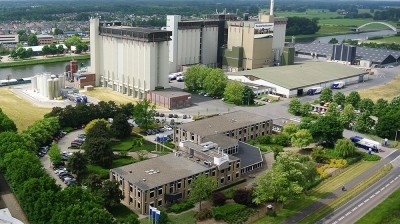UK feed imports faring better than exports following EU exit

“Many companies and suppliers will have carried extra stock, where possible, in advance of December 31, so imports would be relatively low at present,” said James McCulloch, head of the feed sector at Agricultural Industries Confederation (AIC), told FeedNavigator.
After months of negotiations, on December 24, the UK and the European Union (EU) finally announced a deal had been agreed between both parties that would define their future relationship. It came into effect on December 31, 2020.
A spokesperson for one of the largest feed businesses in the UK, ForFarmers, told us the company was not experiencing significant challenges since the beginning of 2021. "We did take some precautionary measures in 2020, in terms of stocking up slightly on certain supplies."
The main implication of this for UK agribusiness is that tariff free trade will continue, avoiding the imposition of significant tariffs on goods travelling both ways. However, the UK’s departure from the EU Single Market and Customs Union means other non-tariff barriers will apply and increase trading costs.
The AIC has praised certain UK government actions to allow a period of grace in relation to some of the changes ushered in.
“The UK authorities phased approach to introducing requirements under IPAFFS over the next six months is welcome and a pragmatic, proportionate implementation of risk management measures,” noted the AIC feed lead.
The Import of Products, Animals, Food and Feed System (IPAFFS) is the UK replacement model for the EU’s Trade Control and Expert System (TRACES) to certify UK imports from the EU or from outside the EEA countries.
“UK legislative architecture for regulated products (feed additives) is in place and the industry remains vigilant in helping to ensure that any EU feed additive renewals and new authorization applications are also made in UK,” added McCulloch.
Feed export disruption
The UK feed sector is seeing disruption, however, in the area of exports.
“Some friction is being experienced by feed industry members in meeting the documentary requirements of some EU customs authorities, particularly for feeds containing animal by products,” revealed McCulloch.
In some cases, these requirements appear not to be harmonized or in-line with the requirements set out in the legislation, he pointed out.
“On the whole, experienced and regular exporters are managing the problems reasonably well. Infrequent exporters, particularly those serving the Northern Ireland (NI) market from Great Britain (GB) are experiencing some difficulties in complying with documentary requirements,” he reported.
New rules have been introduced for imports from GB to NI, and trade disruption has been reported leading to the UK Labor Party this week urging a UK government response, saying there needs to be better guidance for GB companies that are shipping to NI.
Headaches for retailers, seafood sector
Other industries would seem to be having a bumpier ride. William Bain from the British Retail Consortium (BRC) sees hurdles arising from UK’s exit from the EU. "This is the biggest imposition of red tape that businesses have had to deal with in 50 years.”
According to S&P Global, the deal has brought forth complications for the physical trade of food due to the potential for “increased frictional costs for customs measures given the fragmented nature of the food production industry,” with its report highlighting that “the perishable nature of products means getting paperwork right the first time will be vital.”
Three Scottish seafood industry groups—Scotland Food and Drink, Seafood Scotland, and the Scottish Salmon Producers Organization—has turned to the UK government for assistance in resolving disruption to their EU shipments. The groups said in a January 6 statement that “confusion over paperwork, the extra documentation needed, and IT problems have all contributed to delays and hold-ups.”
Commodities market analysts and data provider, ICIS, outlined the changes that ensue from the UK-EU exit deal.
- Customs Declarations will be needed for GB-EU movements, including GB to N Ireland as Great Britain leaves the EU Customs Union
- Northern Ireland rules create a new UK border down the Irish Sea, as it stays in the EU Single Market whilst Great Britain leaves
- Rules of Origin will require companies to provide full details of their supply chain, in order to claim tariff exemption for their exports
- Sanitary & Phytosanitary rules start to protect consumers and plant life – requiring 100% checks on live animals, for example
- The UK’s vital services sector (~80% of GDP) is hardly mentioned in the agreement, with the EU still to decide on “equivalence”
- Freedom of movement ends for workers between the EU – UK, and companies will need to register/re-register for the UKCA/CE/UKNI markings
- Work visas will be required for many EU business trips by UK citizens, and ATA Carnets will be needed to take items to EU trade fairs and music gigs
- UK qualifications will no longer be recognized in the EU, affecting a wide range of jobs from hairdressers to accountants and lawyers
- UK-based airlines and trucking companies will lose cabotage rights – the ability to take passengers/freight between EU destinations















